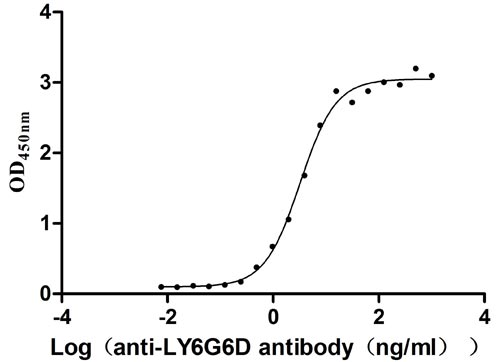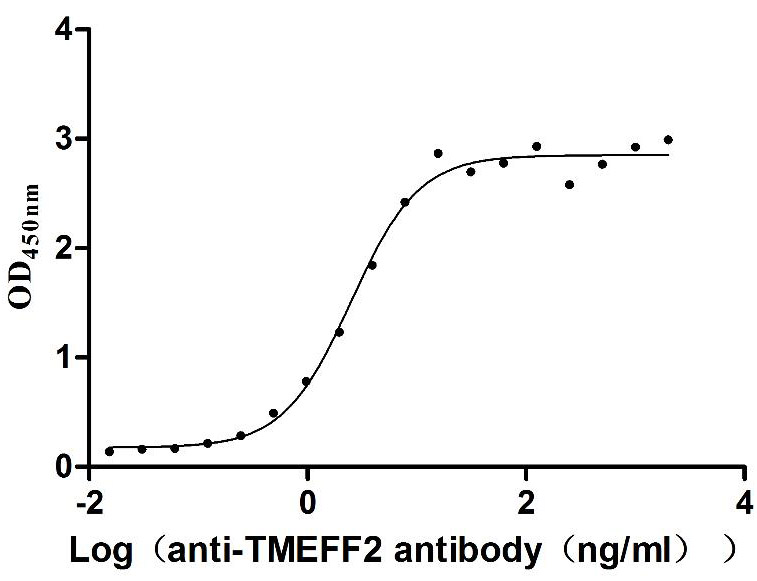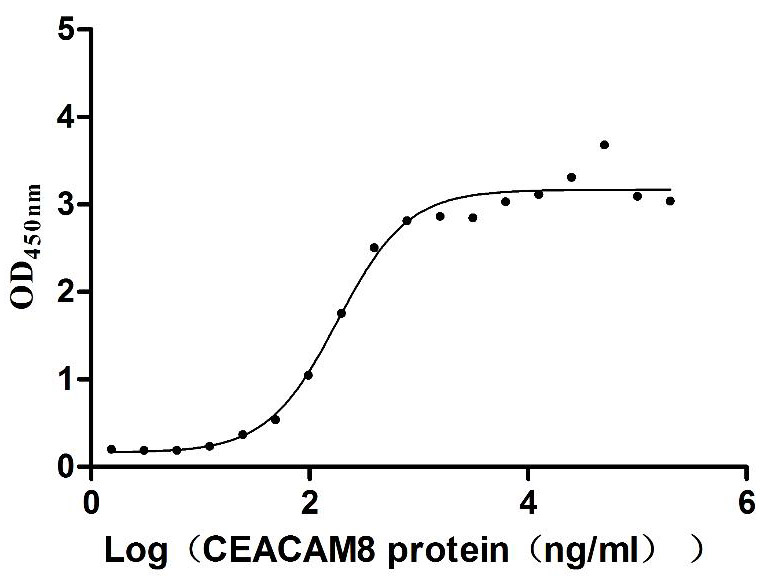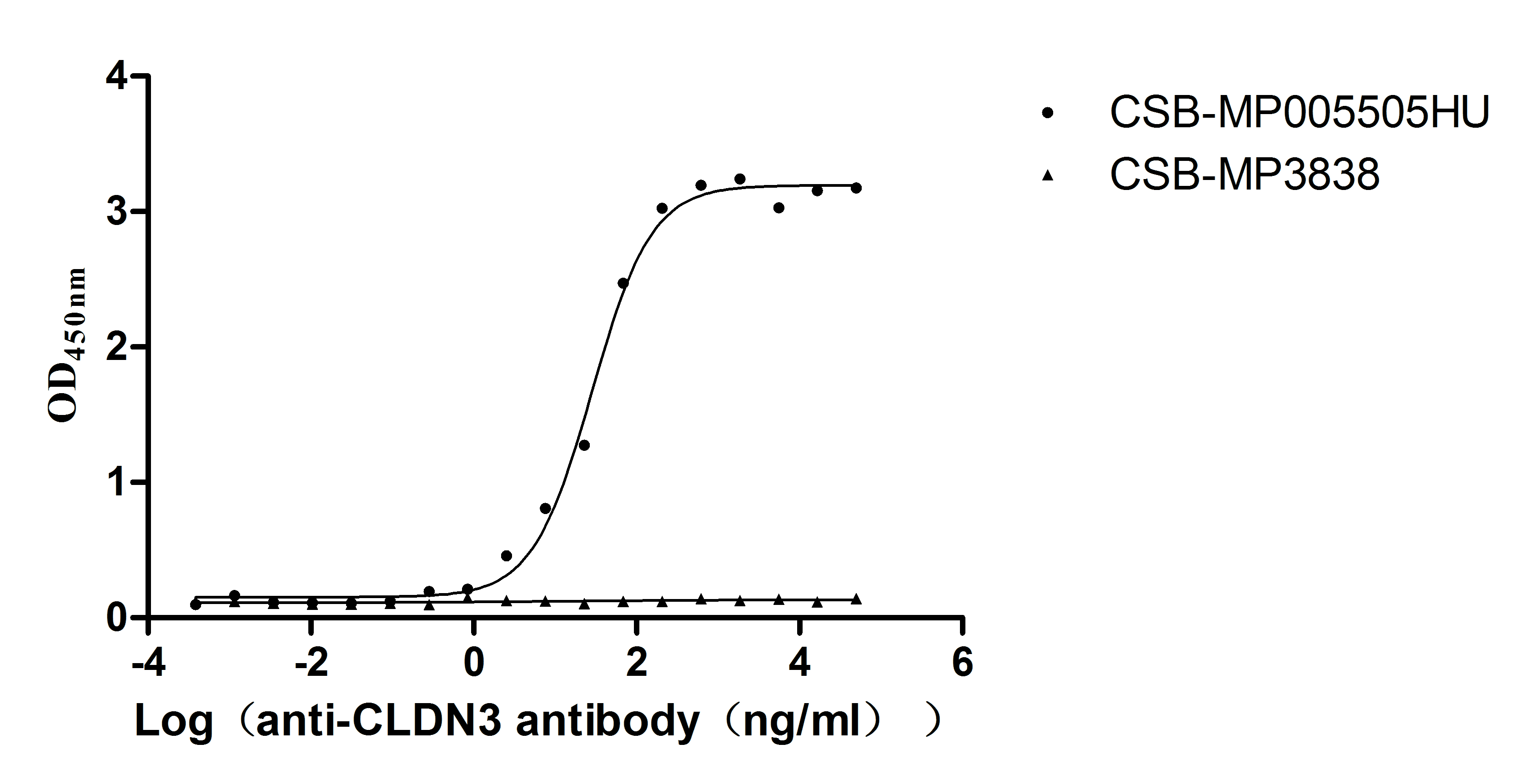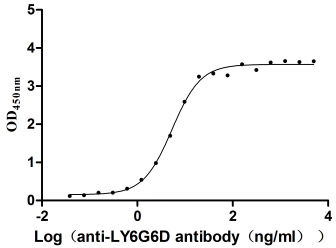Recombinant Mouse Nociceptin receptor (Oprl1), partial
-
货号:CSB-YP016360MO1
-
规格:
-
来源:Yeast
-
其他:
-
货号:CSB-EP016360MO1
-
规格:
-
来源:E.coli
-
其他:
-
货号:CSB-EP016360MO1-B
-
规格:
-
来源:E.coli
-
共轭:Avi-tag Biotinylated
E. coli biotin ligase (BirA) is highly specific in covalently attaching biotin to the 15 amino acid AviTag peptide. This recombinant protein was biotinylated in vivo by AviTag-BirA technology, which method is BriA catalyzes amide linkage between the biotin and the specific lysine of the AviTag.
-
其他:
-
货号:CSB-BP016360MO1
-
规格:
-
来源:Baculovirus
-
其他:
-
货号:CSB-MP016360MO1
-
规格:
-
来源:Mammalian cell
-
其他:
产品详情
-
纯度:>85% (SDS-PAGE)
-
基因名:
-
Uniprot No.:
-
别名:Oprl1; Oor; Oprl; Nociceptin receptor; K3 opiate receptor; Kappa-type 3 opioid receptor; KOR-3; ORGC; Orphanin FQ receptor
-
种属:Mus musculus (Mouse)
-
蛋白长度:Partial
-
蛋白标签:Tag type will be determined during the manufacturing process.
The tag type will be determined during production process. If you have specified tag type, please tell us and we will develop the specified tag preferentially. -
产品提供形式:Lyophilized powder
Note: We will preferentially ship the format that we have in stock, however, if you have any special requirement for the format, please remark your requirement when placing the order, we will prepare according to your demand. -
复溶:We recommend that this vial be briefly centrifuged prior to opening to bring the contents to the bottom. Please reconstitute protein in deionized sterile water to a concentration of 0.1-1.0 mg/mL.We recommend to add 5-50% of glycerol (final concentration) and aliquot for long-term storage at -20℃/-80℃. Our default final concentration of glycerol is 50%. Customers could use it as reference.
-
储存条件:Store at -20°C/-80°C upon receipt, aliquoting is necessary for mutiple use. Avoid repeated freeze-thaw cycles.
-
保质期:The shelf life is related to many factors, storage state, buffer ingredients, storage temperature and the stability of the protein itself.
Generally, the shelf life of liquid form is 6 months at -20°C/-80°C. The shelf life of lyophilized form is 12 months at -20°C/-80°C. -
货期:Delivery time may differ from different purchasing way or location, please kindly consult your local distributors for specific delivery time.Note: All of our proteins are default shipped with normal blue ice packs, if you request to ship with dry ice, please communicate with us in advance and extra fees will be charged.
-
注意事项:Repeated freezing and thawing is not recommended. Store working aliquots at 4°C for up to one week.
-
Datasheet :Please contact us to get it.
相关产品
靶点详情
-
功能:G-protein coupled opioid receptor that functions as receptor for the endogenous neuropeptide nociceptin. Ligand binding causes a conformation change that triggers signaling via guanine nucleotide-binding proteins (G proteins) and modulates the activity of down-stream effectors. Signaling via G proteins mediates inhibition of adenylate cyclase activity and calcium channel activity. Arrestins modulate signaling via G proteins and mediate the activation of alternative signaling pathways that lead to the activation of MAP kinases. Plays a role in modulating nociception and the perception of pain. Plays a role in the regulation of locomotor activity by the neuropeptide nociceptin.
-
基因功能参考文献:
- nociceptin opioid receptor agonists are promising drugs for treating pain in sickle cell anemia. PMID: 26294734
- These knock-in mice have NOP receptors that function both in vitro and in vivo and have provided a detailed characterization of NOP receptors in brain, spinal cord, and DRG neurons. PMID: 26290245
- Oprl1 is associated with amygdala function, fear processing, and posttraumatic stress disorder symptoms. PMID: 23740899
- Data suggest that NOPR and MOPR (mu-type opioid receptor) in spinal cord independently drive antinociception; NOPR/MOPR ligands attenuate neuropathic/inflammatory pain and have high antinociceptive potency with low tolerance development. PMID: 23652222
- Data suggest that nociceptin receptor/nociceptin signaling plays a role in the disease pathogenesis of inflammatory bowel diseases. PMID: 22449384
- The results of this study demonstrated the contribution of the NOP receptor in controlling food intake and meal pattern, as well as glutamate release and GIRK1 channel activity at POMC synapses. PMID: 20510254
- These results suggest differential requirements for ORL(1) in the mediation of neuroimmune effects exerted at different times after an immune challenge. PMID: 19913923
- OPR is not crucial for development of either acute or neuropathic nociceptive responses, or for the regulation of full receptor-mediated responses to opioid agonists PMID: 12217419
- The region-specific up-regulation of the opioid receptor-like 1 receptor indicates a tonic role for nociceptin/orphanin FQ in some brain structures and may suggest the peptide regulates the receptor expression in these regions. PMID: 12605902
- Place cells in nociceptin receptor knockout mice were abnormal in several ways: they were less stable, had noisier positional firing patterns, larger firing fields and higher discharge rates inside and outside the firing fields PMID: 15774528
- NOC receptor is involved in hippocampal cholinergic function PMID: 15979594
- RGS19 prefers regulating ORL1 receptor signaling over other opioid receptors, and the N-terminal domain of RGS19 plays a crucial role in its receptor preference PMID: 16219326
- nociceptin receptor has a role in the antinociceptive action of nitrous oxide PMID: 16931689
- Nociceptin released from interneurons by their high-frequency activation is a novel endogenous neuromodulator that negatively regulates induction of long-term potentiation in the hippocampus through direct modulation of pyramidal cells. PMID: 17475793
- the ability of buprenorphine to interact with the ORL1 receptor modulates its acute motor stimulatory and rewarding effects. PMID: 18634857
- findings demonstrate the existence of functional antagonism between nociceptin opioid peptide receptor and NMDA receptors that predominantly contributes to modulation of conditioned fear learning which involves spatial-processing demands PMID: 19100850
- Mice lacking the influence of endogenous N/OFQ are hypersensitive to nicotine in most measures, showing a role of endogenous nociceptin in modulating or mediating the acute effects of nicotine, and possibly nicotine addiction. PMID: 19371589
显示更多
收起更多
-
亚细胞定位:Cell membrane; Multi-pass membrane protein. Cytoplasmic vesicle.
-
蛋白家族:G-protein coupled receptor 1 family
-
组织特异性:In the brain, isoform KOR3 and isoform KOR3C are most abundant in hypothalamus and periaqueductal gray. Isoform KOR3A is highly expressed in cortex, striatum and brainstem. Isoform KOR3D is highly expressed in cerebellum, hypothalamus and brainstem. Detec
-
数据库链接:
KEGG: mmu:18389
STRING: 10090.ENSMUSP00000071513
UniGene: Mm.285075
Most popular with customers
-
Recombinant Human Lymphotoxin-alpha (LTA) (Active)
Express system: Mammalian cell
Species: Homo sapiens (Human)
-
Recombinant Human Leukemia inhibitory factor (LIF) (Active)
Express system: Mammalian cell
Species: Homo sapiens (Human)
-
Recombinant Human Lymphocyte antigen 6 complex locus protein G6d (LY6G6D) (Active)
Express system: Yeast
Species: Homo sapiens (Human)
-
Recombinant Human Tomoregulin-2 (TMEFF2), partial (Active)
Express system: Mammalian cell
Species: Homo sapiens (Human)
-
Recombinant Human Carcinoembryonic antigen-related cell adhesion molecule 6 (CEACAM6) (Active)
Express system: Mammalian cell
Species: Homo sapiens (Human)
-
Recombinant Human Claudin-3 (CLDN3)-VLPs (Active)
Express system: Mammalian cell
Species: Homo sapiens (Human)
-
Recombinant Macaca fascicularis lymphocyte antigen 6 family member G6D (LY6G6D) (Active)
Express system: Yeast
Species: Macaca fascicularis (Crab-eating macaque) (Cynomolgus monkey)
-
Recombinant Mouse Gastric inhibitory polypeptide receptor (Gipr), partial (Active)
Express system: Mammalian cell
Species: Mus musculus (Mouse)




